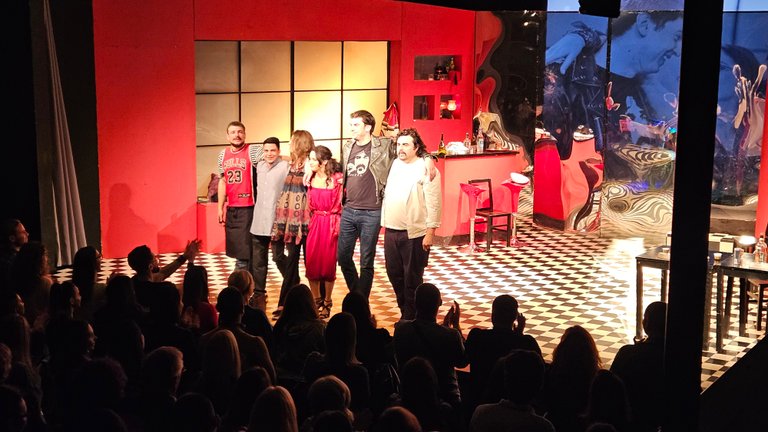
After several minutes of applause, standing ovation and the actors coming out for an encore, to bow and thank the audience for their applause, the curtain finally fell.
With the end of the performance, it was time to put the handkerchiefs in our pockets, with which a few of us in the audience wiped away our tears.
The emotion that overwhelmed the audience was not only there because of the phenomenal performance of our young actors, but because of the story of the play we watched.
"Osama - Kasaba in New York", a play in the Zvezdara Theater that had its hundredth performance exactly one year ago, on the starry sky of the theater scene, gave birth to five phenomenal actors, students at the time of the play's beginning, who today are already giants of the theater.
〰️〰️〰️〰️〰️〰️〰️〰️〰️〰️〰️〰️〰️〰️〰️〰️〰️〰️
We lived happily in the Balkans in Tito's Yugoslavia.
A communist country, socialism, so there were no social differences like there are today.
Childhoods were happy, marriages were mixed, and nationalism was hidden due to the nationalists' fear of the regime.
When the communist leader Tito left us, on the surface of the until then calm sea, our YU, national interests erupted and created a storm. The storm turns into a whirlwind of war and a bloody civil war.
Well, this play is not about the civil war.
If you were born before 1980, in one of the republics of the SFRY, it is very likely that you knew or met at least one nice Bosnian.
Not the one from the jokes, but a fun, cheerful, chatty, good-natured guy who smokes Marlboro from Sarajevo, Bond, Drina (Sarajevo of course), drinks whatever he can get (beer mostly), shoots shots at his own and other people's expense.
And this is exactly the storyteller and the main character in the play, who describes the days of his youth in a fun, funny, tragic, emotional way, from the perspective of an older coffee shop worker in New York, returning with the story to his Kasaba, a fictional town in Bosnia, not far from Sarajevo. ..
The character in the play, a pioneer from Tito's time, Bosnian, Muslim, had friends, godfathers, girlfriends of other nationalities, he had friends with whom he made parties, drank, chased girls, mourned, rejoiced and sang "Kad ja podjoh na Bembaša" (when the two actors thunderously sang this Sevdalinka, the unofficial Sarajevo anthem, the tears began to flow on their own...), he had a country where he was happy and to which he belonged...
In his youth, that same Bosnian becomes an apostate, an emigrant and a refugee .
Unaccepted and misunderstood where he found himself, and surplus where he came from...
And this loss, the loss of the country, the loss of friends, the loss of happy youth, the loss of identity is what touches part of the audience emotionally...
I remember such characters that appeared in my environment with the interruption of my happy childhood in 1991...
In the high school, new students began to arrive, young people who had to leave their homes, cities and Bosnia in the whirlwind of war.
The emotion that the actors expressed last night is almost the same as the one that our new friends, the Bosnians, had when, as teenagers, they told us about their life in the towns they had to flee from...
It was only after several years, when they made new friends in a new environment, adopted some new habits and shook off the horror of wartime suffering, that they could finally say that they were accepted.
Our Bosnian from the play was from a generation older than mine and never managed to break free from the hell of exile, lost friends, love, condemned to wander, work and live in a "foreign" country for the rest of his life.
〰️〰️〰️〰️〰️〰️〰️〰️〰️〰️〰️〰️〰️〰️〰️〰️〰️〰️
And you, have you ever met a Bosnian? Did you have the opportunity to drink some beer, eat "burek" or "ćevape" pie or young lamb with him?
Did you ever have "jaran" from Bosnia?